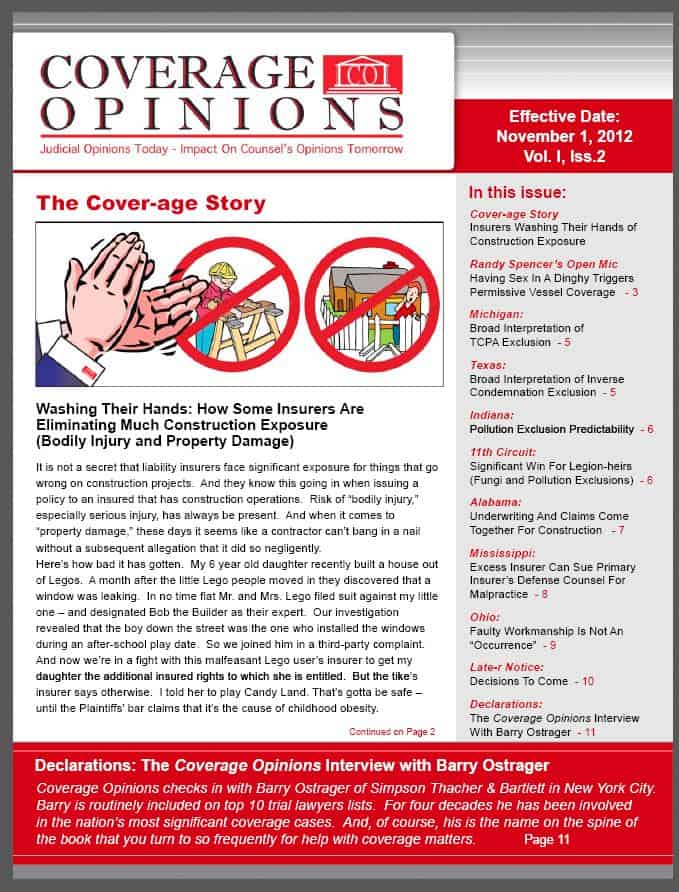The One Contract You Never Read: Insurance


Good Idea ?
Probably not !
Let’s look at a few headline cases:
The Cases
Pollution Exclusion Precluded Coverage of Claims by Hotel Guests Harmed by Carbon Monoxide: (Shaw v. Liberty Mutual Fire Ins. Co. (M.D. Fla, Feb 12, 2016)6)
D&O Claim Against Broker-Dealer Precluded by “Professional Services” Exclusion: (David Lerner Assoc. v. Philadelphia Indem. Ins. Co., U.S. District Court, E.D. New York, Mar 29, 2013)
Contractor’s Liability Insurance Does Not Cover Injury to Job-site Workers: (Ingalls Shipbuilding v. Federal Insurance Co., U.S. Court of Appeals for the 5th Circuit, May 22, 1992)
These are just three examples of many, where the insured has had to sue its own insurer for coverage for obvious and severe loss exposures. If your broker cannot prevent coverage gaps for these clearly discernable severity-type claim scenarios, how can you even hope there won’t be many, many other problems lurking in the depths of the fine print.
Just another contract
And from the insurance underwriter’s point of view, please be aware that a policy is simply a contract to be negotiated, with each side protecting its own interests. If this point needs any reinforcement, look at this commentary from an insurer-side attorney talking to his clients:
“It’s not a secret that liability insurers face significant exposure for things that go wrong on construction projects. … A look at some recent judicial decisions… demonstrates that insurers – those who are inclined to do so – can issue liability policies to contractor-insureds and be protected against much of the risk. … Notwithstanding that bodily injury is an ever-present risk for insureds that have construction operations, some insurers have written endorsements that can eliminate much of the exposure. …” (italics added).*
Who’s being protected?
Don’t miss the point that the “protection” against the “exposure” in this above discussion is for the benefit of the insurance company – not the insured!
How Coverage Problems Develop

Let’s look at the major ways coverage can fail:
1. The “insuring agreement” is not broad enough to pick up the full scope of operations. In this case you were never covered from the start.
2. Ambiguous “insuring agreement.” The policy definitions which control the breadth of the insuring agreement may not be clear, or may be different than or even opposite from “plain English”, so that there is a misunderstanding by the insured at to what is covered.
3. “Exclusions” are brought into play. Policies have entire exclusion sections, and the separate exclusions can easily number into the twenties and thirties. The job of the policy reader is to determine if what is being excluded is covered elsewhere, is an exposure or activity the insured does not have, or engage in, or is relevant and important.
4. One or more “exclusions” are ambiguous. Sometimes the exclusions are clear and there no question what they mean. Other times they rely on definitions of words contained in the exclusion language, and these are subject to multiple interpretations. For example, right now sexual abuse is a hot topic and many insurers are trying to exclude it from liability policies. Some such exclusions are absolute, while others depend on a certain fact-pattern. One type of exclusion that is fact pattern-based is: was the claimant “in the care, custody or control” of the insured. This would depend on the detail of the specific relationship and the specific facts at the time of any incident that might lead to a claim.
5. Not covered for various other reasons – a few of the more common:
a) violation of a policy condition such as failure to implement loss control protocols;
b) misrepresentation on the application;
c) policy limit (or sublimit) exhausted.
Don’t be passive
So, your broker presents you with a five-page proposal and says you should buy this policy. You know in the back of your mind that the 100 plus page policy will show up later. Was there a meeting of the minds? Hardly.
Risk is flowing towards all businesses at all times. It actually sticks to those who are passive. Don’t be passive.

Frank Licata
[email protected]; 617.718.5901
*Randy Maniloff, White & Williams, Coverage Opinions, November 1, 2012
Aug 12, 2019




